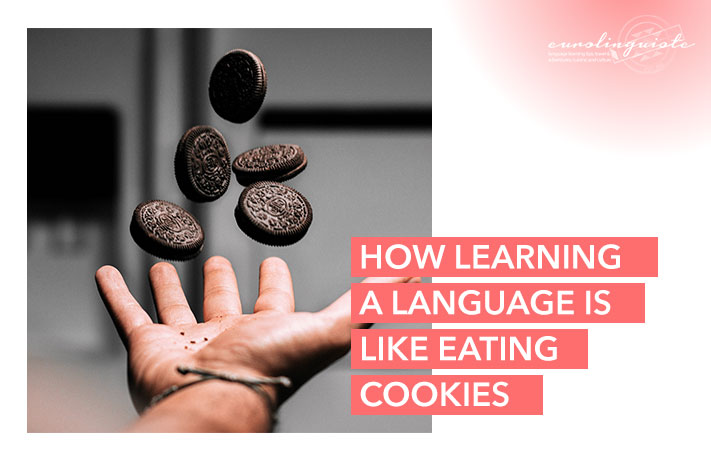How Learning a Language is Like Eating Cookies

My name is Shannon Kennedy and I'm the language lover,…
This month I am honoured to feature a guest post from Jarvis1000 from I Want 2 Speak Thai, a linguist fluent in Thai and English and learning Spanish. I admire Jarvis1000 greatly because he is able to excellently balance his family, a job and language learning (something I one day inspire to do as well!). All this goes without saying that in addition to his already busy schedule, he still finds time to write inspiring posts on learning languages.
He no longer has a blog, but I really enjoyed his posts when he did!
How Learning a Language is Like Eating Cookies
When I was 19 years old, I did like many young men in my church and became a missionary. I spent two years of my early adult life in “AMAZING THAILAND” and came back fluent in Thai. Fast forward 10 years and I am now a 30 something married father of 4 kids. I work 40+ hours a week along with my other responsibilities as a father. On top of all that I am learning Spanish. Though there are many things I learned about language learning in Thailand, learning how to apply them to my current situation has been totally different.

Learning a foreign language is like eating a tim tam slam I am sure most of you know what an Oreo Cookie is. A childhood is not complete without dunking an Oreo cookie in milk every so often.
On the other hand, you may or may not have heard of a Tim Tam. I was introduced to Tim Tams by my wife, who is from New Zealand. It’s a cookie (or a ‘biscuit’ as my wife would call it) that is made of too thin chocolate wafers with a chocolate crème filling. The entire thing is then coated in chocolate.
When my wife introduced Tim Tams to me it wasn’t just, “here’s a Tim Tam.” She introduced them to me as a “Tim Tam Slam.”
A Tim Tam Slam is done by first preparing a hot chocolate beverage of your choice. Then, after biting little bites on each side of the Tim Tam, you use the Tim Tam as a straw to suck up the hot chocolate into the biscuit. Once saturated, you tilt your head back and let the warm chocolate goodness fall into your mouth and enjoy. It’s one of the greatest chocolaty pass times I have ever experienced!
What does that have to do with language learning?
For me, learning Thai in Thailand was like having a Tim Tam Slam. When you suck up that hot chocolate, you have committed to eating that whole thing with all you have in you. You can’t go back, you NEED to eat that thing or make a horrible mess otherwise. Immersion commits you to learning the language. When you do eat it, though it might be a bit overwhelming for a moment, you eventually just sit back and embrace immersion for what it is!
Right now, I am not learning Spanish in an immersive environment. I don’t NEED to learn Spanish. In fact, it can be difficult to find opportunities in my regular day-to-day life to use it. Learning Spanish is less like a Tim Tam Slam and more like dunking Oreo’s in Milk. No matter how much I want to learn, I will never be able to be as committed to it as if I lived or worked in an immersive environment.
There is another way I have notice that it is like dunking Oreo’s. If I put it in and out too quickly, it’s basically pointless even dunking it. On the other hand, if I put it in too long the cookie crumbles and falls to the bottom of the milk, ruining the cookie and the milk in the processes. When I learn something, I need to do it in such away as to keep my confidence and motivation going long enough to actually get something done. At the same time, if I try to do too much I lose all confidence and motivation to do anything at all.
So how does one do that?
There are many things one can do, but that are a few tips and trick that I have learned on the way.
Set a plan/system. I have created a system that I follow day in and day out. I use a combination of input and output activities as well as both structured and unstructured activities to help me. The most important thing is that you should never wonder to yourself, “What am I going to do this week?”
Be Flexible. Nothing will ever go as you plan. Adapt. As you start getting better at certain things, you will find it is no longer useful to practice the language in one way or another. Don’t fret about it; just go with the flow and change.
Find as many opportunities to talk out loud. Talk to the wall or your steering wheel. Don’t know how to say what you want to say yet? Do what you know and fill in the rest with your native language. Don’t know the past tense yet? Just use the present tense for now and just use a lot of context words like already or yesterday. Some will say that you will “create bad habits.” Let me ask you, have you ever known an adult who was stuck saying “pasgetti” all of their life because they didn’t know how to say it as a kid? Me neither. Just talk!
Don’t just learn a language, live it. Learn how to say and talk about what you already do everyday. If you like Sports, then learn the Sports words you need. I mean everything, so you can listen to a play-by-play announcer and listen to commentator talk about player contracts. Don’t just learn how to say your profession, learn every detail of your profession in your language.
Don’t worry if you can’t do all you want to do right away. Its baby steps. To paraphrase a bad joke, how do you eat a packet of Oreo cookies? One dunk at a time.
My name is Shannon Kennedy and I'm the language lover, traveler, and foodie behind Eurolinguiste. I'm also the Head Coach of the Fluent in 3 Months Bootcamp, co-founder of Women in Language, and former Resident Polyglot at Drops.




